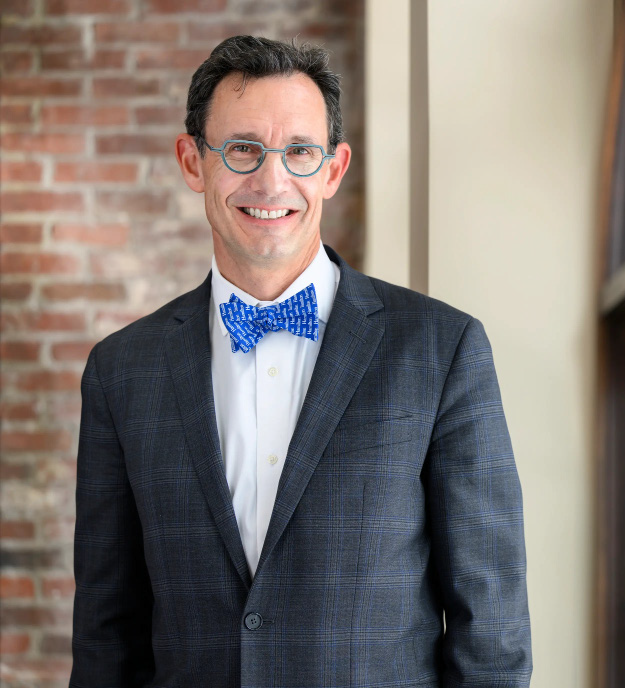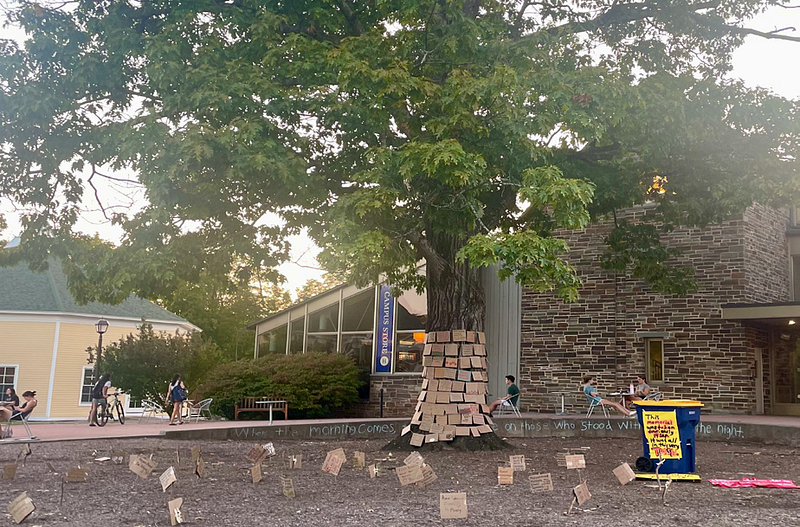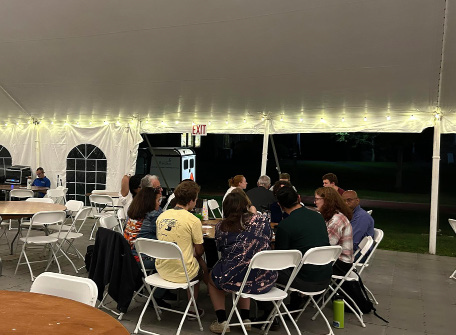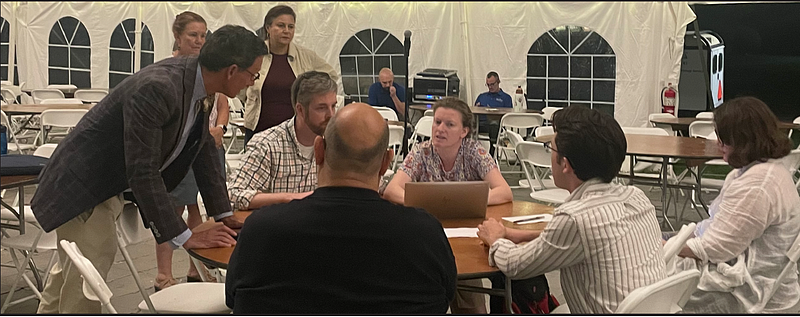
At one of his first campus-wide events, President Steven Tepper invited Hamilton College community members to explore our engagement with each other over global events. He framed the conversation by explaining that he received many emails in the past week with community members expressing concern and asking questions; in response, he wanted to create a space to think through those messages. For nearly two hours on Sunday night, approximately 40–50 students and faculty listened to each other at small table discussions, shared their discussions with the group, and asked each other some challenging and thought-provoking questions. Tepper told The Spectator he was “very, very happy” with the conversation.
Contextualizing his decision to run the community conversation, Tepper echoed sentiments from his introduction email to the Hamilton community, in which he shared his hopes for how Hamilton community members engage with each other. Tepper remarked that “more expression is better than less…words can hurt and we should care about that…we must affirm the dignity of people involved and respect their identities…we must allow students to evolve education.” Tepper then shared his vision for the evening’s structure: he would share prompting questions, ask attendees to discuss their thoughts at the table they were sitting and then ask folks to share what their table discussed afterward.

Tepper began the conversation by asking the group: “What is your hope for the College this semester or year about exchange, protest and education?” During the discussions among the tables, a student representative from Hamiltonians for Divestment explained that they felt the protest policies were nebulous and potentially blocked students from protesting what they believed in. They added, “I feel strongly enough about what I think that I am not scared of what the consequences might be. I am uncertain what the rules mean and what outcomes they would entail.” Another representative jumped in, saying, “I’m hoping to see a change this semester in the support of all of the students on campus instead of just certain groups, independent of what the administration wants.” Tepper responded that “the administration has to be neutral. It’s not our role to make decisions.”

After around 15 minutes, Tepper gathered everyone’s attention and asked attendees to share what they discussed at their tables. Gabby Nakkab ʼ25 shared her hopes for the college regarding exchange, protest and education to be “making learning more accessible and making more ways to engage people. Let’s not limit our learning to one club we associate with, but expand our learning to other groups.
Creative education sessions could be comedian visits or cultural food cooking classes.” Chair and Christian A. Johnson Excellence in Teaching Professor of Philosophy Russell Marcus took the microphone next, saying “we want to encourage more conversations across disagreements and make people more comfortable across disagreement. There are skills for doing that that are learnable, for all of us, not just students. We [the faculty] need to learn how to teach these skills.” Samantha Glickman ʼ25 shared her value in “becoming comfortable with the uncomfortable conversations. As students and academic professionals, it’s a great space…to bring people together to hear what other people are thinking and take away what you want to from it.”
After everyone got a chance to speak, Tepper affirmed that he had heard and listened to attendees’ hopes.
Next, Tepper asked his second question of the evening: “How do we balance the need for open dialogue with the responsibility to prevent the spread of hateful rhetoric?” During the table discussion, Lecturer in Environmental Studies Alma Lowry said “with hateful speech, if you go in with a goal of understanding the person, it avoids someone being slammed or ostracized, especially if you understand people make mistakes in the heat of the moment.” A student representative from Hamiltonians for Divestment chimed in, saying that “fear can be weaponized to hurt the very existence of other people.”
When it became time to share with the rest of the attendees, a student explained, “We spoke a lot about the ways we found people speaking on campus about Palestine. We talked a lot about the notion of civility, which is a tool of power.” Glickman shared that “one thing we talked about was the importance of allowing students to ask questions….Building spaces on campus that students can come in and not feel uncomfortable asking questions.” Diego E. Inzunza ʼ25 added to Glickman’s point, saying “I would hope the school would protect students who are trying to create educational spaces.” Nakkab shared her hopes for preventing the spread of hateful rhetoric, imploring students to use “‘I feel’ statements when we talk because there is a reason we all feel the way we do. There is a reason a person feels that way.”
Another student took the microphone for the last comment, sharing that “civility and kindness are separate. Civility is a method that is defined by a certain somebody. Kindness is not subjective.” Once all students and faculty had shared the contributions from their table discussion, Tepper again affirmed what he had heard. “Seems like everyone here wants to grow in an exchange when you have an opinion. That’s a mandate for us to put that into process,” said Tepper.
Tepper then opened the forum for questions. One student asked “What is the response from the Office of the President about the memorial and art installation for 200 dead Palestinian children that was torn down Saturday morning?” Tepper responded that “we need to register this as public art through the event protocols in the new protest rules.” He explained that if the art installation is documented through the school, then proper responses can be taken in the event that it is vandalized. Tepper revealed that no form was actually available at the time of the installation after the student asked where to find the form. “We need to revise that and give you a place with a new link,” Tepper said.
David Klein, a man who later told The Spectator he had no affiliation with the College, raised his hand for the microphone. “I came to a group that is very different from me. This group talked about the distinction between civility and kindness,” Klein said. He went on, saying “The demonstration and memorial on campus speaks to kindness and awareness of a tragedy…The people who want this college to divest, what is their opinion about the 1400 people who were killed, raped and beheaded?” At this point, Tepper took the microphone from Klein and cut him off, saying “this is not the space for that type of conversation.” After the event, The Spectator asked Klein to elaborate on his attendance at the conversation and if he wanted to share any further thoughts. Klein answered that he was a volunteer docent from Montclair, New Jersey and was in the area for museum work. When prompted further, he asked The Spectator to email him so he could gather his thoughts. He has not responded to The Spectator’s emails.
As a final question for the evening, Glickman asked “how can we make spaces that all organizations and students on campus feel comfortable joining?” Tepper responded that “our public spaces need to be a churn of ideas. No one can claim public space forever. We have to get the balance right.” Iso Dlodlo ʼ27 then chimed in, turning to face Glickman and said “I’d invite you to come to SJP [Students for Justice in Palestine]. We can have a conversation and make something beautiful.”
Even after the event finished, many students and faculty remained in thoughtful conversation with each other. Many crossed the room to speak to those who had been at separate tables. Inzunza ʼ25 told The Spectator that “we will, we, as a student organization, specifically the Hamiltonians for Divestment, will continue to show up and show out at these meetings and discussions and conversations to ensure that the College will commit to our ideals of disclosure of the endowment and divestment from any systems of oppression, including the ongoing materiel support for the state of Israel.”
As students and faculty conversed, Tepper had a conversation with The Spectator. When asked how he thought the conversation went, he responded “I was very, very happy. I thought that it was not a series of declarations, but it was people sharing their hopes. It really was, right? Everyone is in a different place and they’ve experienced the College’s policies differently, they’ve experienced expression differently, but they were willing to share that in the sense of ‘can we do better?’” Tepper went on, “I think of course we can. Until we have a conversation like this, it’s hard to know where you need to lean in.”
When asked if there was anything particularly hard about facilitating the conversation, Tepper took a moment to reflect, and then answered that “I don’t think it was hard; I think we didn’t have a design for how to put people in groups where they might be talking with people they didn’t know. A few people had the courage to jump to a [new] table. That’s just because it was our first time. We didn’t know who would show up; we didn’t know how it would work; we didn’t know if this format would be something people liked. I definitely think this idea that we can have prompts and then have conversation and share out, I thought that worked. We just have to figure out how to maybe optimize the discussions across differences. We probably didn’t have the facilitation that we would need to be able to help tables do that, so it’s okay that people were not fully mixing. I think they will in the future.”
Tepper ended his conversation with The Spectator by adding that “there’s an invitation to suggest forums, speakers, conversations, and programs that will help people navigate and grow and learn in whatever ways they want to. I want suggestions. If you want to bring an artist in…have a debate…if you want a historian to come…if you want to take a linguist to talk about language and how it’s used or misused or appropriated…there is an open invitation.”

















